GULU, UGANDA: Authorities in Uganda’s government are now gripped in fear over a looming energy fuel catastrophe as President’s ban against charcoal trade takes shape in the northern region which is seen as the biggest producer supplying charcoal to major urban towns in the country.
“Right Now, a bag of charcoal in Kampala has doubled in [price]. 90% of the people in Kampala use Charcoal,” the Senior Presidential Advisor on Defence and Security, en Kaleb Akandwanaho, alias Gen Salim Saleh revealed while speaking to leaders and technical staff across Lango, Acholi and West Nile during a meeting at Gulu University recently.
“Can the compromise be made on people used to bush clearing for charcoal burning? Because the blanket orders that I see there, is going to cause acute shortage of charcoal,” he remarked, suggesting whether people burning charcoal to clear bushes could be allowed to continue without causing destruction to environment, citing example in Ssembabule and Ankole, which were not “destructive.”
The meeting with the Acholi leaders held from 21st to 23rd June brought hundreds of the RDCs, RCCs, LC5 chairpersons, CAOs, and some LC3 chairpersons including security teams from all the selected sub-regions. The main objective of the meeting was to get representatives of all the districts in the sub-region to form a sub-regional committee and to chat ways on how factors of production can be enhanced to increase production and fight poverty in the selected sub-regions.
During the meeting, the issue of charcoal burning and Balaalo topped the discussion, which prompted Gen Saleh to advise the team to be very careful and implement the order freely without causing ethnicity.
“Normally when such an order comes out, you take out tasks by creating the immediate, medium and long-term strategies. So, he[Museveni] directed me to discuss with you-the leaders and give him feedback so that he can come out with implementable orders,” the army General advises.
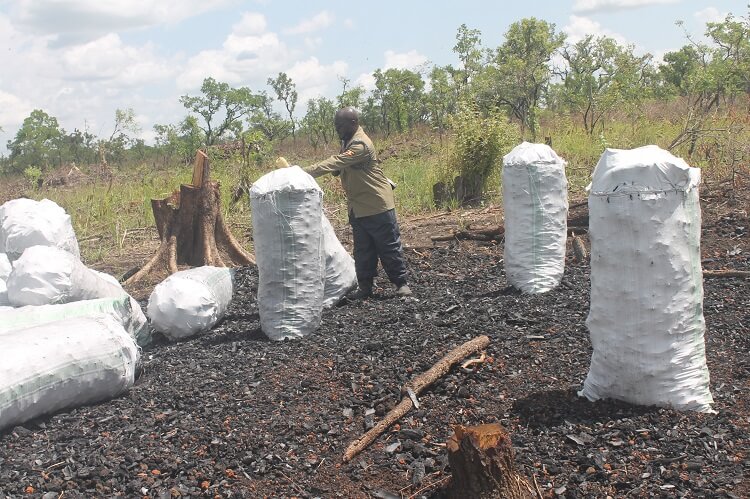
“Blanket Order or Executive Order No.3”
On 24th May 2023, President Yoweri Museveni Kaguta issued an executive order exercised under Article 99(2) banning Charcoal trade across greater northern region of Karamoja, Acholi, Teso, Lango and West Nile. The ban comes after leaders from the Acholi subregion had raised concerns about the rising illegal charcoal trade in the region which is destroying the environment.
“In order to save the environment region and the reputation of the NRM, I therefore hereby ban the cutting of trees for charcoal burning” the order reads in part
President Museveni, in the order, condemned some corrupt personnel in the security forces including officials of Environment and National Forest Authority for apparently abetting the rising charcoal trade, citing that some of them have gone as far as escorting charcoal trucks on the road to penetrate some security checkpoint.
“The people in charge of the Environment and Forestry allow this destructive business to go on massively. Apparently, armed people escort this charcoal. Where are the armed guards coming from, and who is providing them; all the same, the question must be answered?” Museveni questioned

As Northern Uganda entered sixteen years into recovery from the LRA war, the one time war-ravaged area, started witnessing the worst ever environmental injustice to tree cutting for the commercial trade of logs, timbers and charcoal. The vice does not only deplete the forest cover but is causing massive soil degradation as charcoal burners are also removing the roots of the trees that should regenerate and hold the soil, for burning charcoal.
Much as statistics to show level of forest destruction in northern Uganda remains scanty, the Global Forest Watch journal, states that Uganda lost 64.1kha of its 6.93mha between year 2010 and 2022, representing over 20% of its land area, accounting for 33.3Mt of CO2 emission.
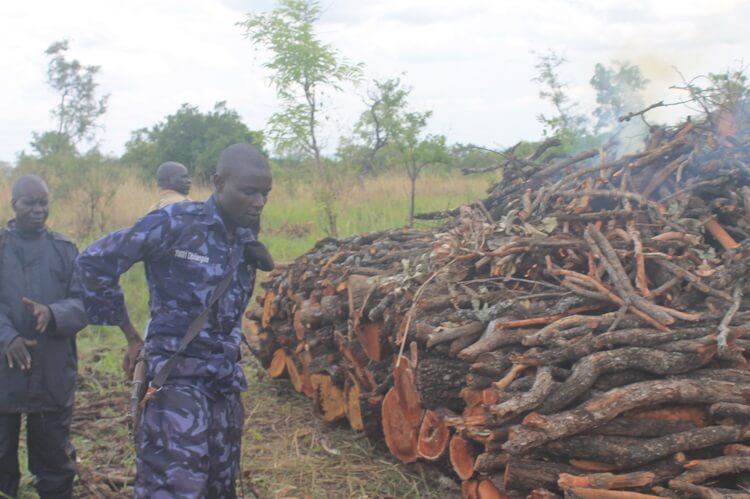
In Gulu [West Acholi] region, which comprises of Amuru, Omoro, Nwoya, Kilak, Aswa, and Gulu district show the highest amount of forest cover loss of up to 78% of all tree cover between 2001 and 2022 and Kilak emerged on top with 18.1kha loss higher the national average of 8.03kha.
Meanwhile, Adjumani lost 723ha of its 159kha between 2010 and 2022 representing up to 52% loss of its land area, accounting to 332kt of Carbon dioxide (CO2e) gas emission into the atmosphere.
The statistics also ranked Uganda in position 52nd after Belarus (1.04Mha)with up to 1.03Mha losses of its relative tree cover between the years 2001 and 2022, accounting to 13% decrease since 2000 and 0.22% globally. The Republic of Congo came in the 53rd position with 968kha losses during the same period.
Blue Fun Favourite Season Bar Graph by David OkemaAcholi District Leaders Suggest
While presenting the position of leaders from Acholi region, the chairman of Acholi Parliamentary Group, Anthony Akol, pointed out critical issues surrounding the charcoal ban. They observed that the land owner renting their land for charcoal burners should become prime targets. Any army officer escorting charcoal trucks, upon identification, should be reprimanded and tried in a military court martial. Anybody transporting more than 10 bags of charcoal, upon arrest, shall be made to pay a fine of Ugx2M owner and the driver to pay a fine of Ugx500,000.
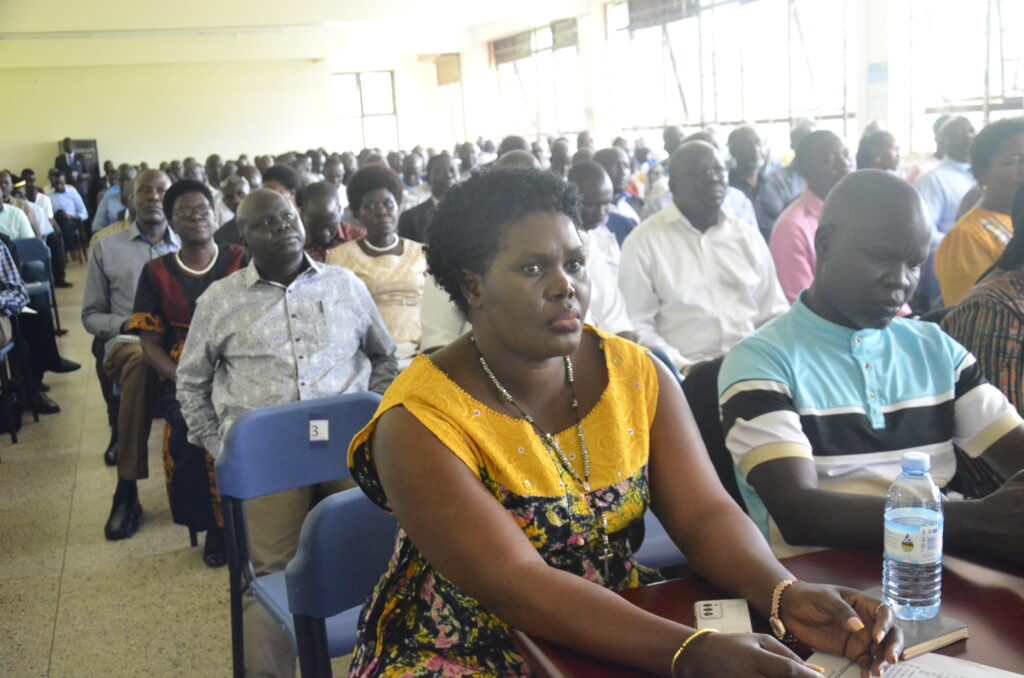
Low-Income Urban Dwellers Cry
Basemera Brenda Amooti, 35, a primary school teacher and resident of Katooke in Nansana Municipality Kampala said since the President issued ban on the charcoal trade, the price for a bag of charcoal shot up.
According to Basemera, they initially buy charcoal at prices ranging from Ugx55,000 to Ugx60,000 but right now it has shot up to Ugx85,000 a bag, which is very expensive for the majority of low income households.
Alternatively, some families switching to gas and electricity, still find it too expensive. According to the market price, a 3kg cylinder gas goes for Ugx175,100/= and a refill is at Ugx28,000/= at Total Gaz, a 6kg cost Ugx218,500/= and refill Ugx 56,000/= and the biggest size of 38kgs cost Ugx 747,400/= at the same company.
Meanwhile, at Shell Gas, a 6kg cylinder goes for Ugx189,000, refills at Ugx55,000 and a bulk cylinder of 48kg goes for Ugx 652,000 and refills at Ugx322,000 slightly below.
The prices of Electricity as of 2022 statement issued by Electricity Regulatory Authority (ERA) states increment in the power tariff for Domestic Consumers from Ugx747.5 to 820.9, Commercial Consumers from Ugx580.6 to Ugx637.7, Medium Industrial Consumers from Ugx439.1 to Ugx482.3 and Large Consumers from 355.0 to Ugx388.5 and Extra Large Consumers from Ugx300.2 to Ugx328.5.
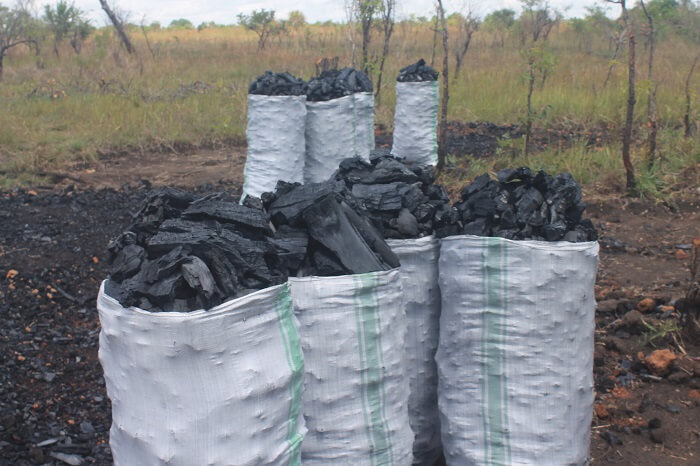
As Uganda strives to achieve Sustainable Development Goal 7 to ensure absolute access to electricity to every household, the Energy Progress Report by World Bank as of year 2021, still puts Uganda at 45.2% in terms of access to electricity at household level. In urban areas, the statistic is at 72.3%. Whereas Ugandas’ access to electricity has registered significant growth between 1991 and 2020 from 14.99% to 42.7%, the country still lags behind at number 182 out of 196 countries globally, according to The Global Economy.
For a social worker like Tracey Patricia Angwech, 25, who even earns a very meagre salary, gas is even too expensive and not sustainable. Angwech, who is a resident of Kawanda in Kyadondo East in Kampala, said they have decided to get charcoal in one or two bags straight from their relatives in Kitgum district. She says charcoal became unaffordable within Kyadondo, a big sack of charcoal is now sold at prices between Ugx80,000 and Ugx90,000.
Gaps in Enforcements
From June 26th to July 7th this year, a few weeks after the president issued executive order No.3, the National Forest Authority regional operation office in Gulu City together with Environmental police impounded over 30 trucks of charcoal each carrying an average of 250 bags of charcoal and were charged in court. According to a report by the Food and Agricultural Organizing (FAO), a bag of charcoal in the tropical region weighs an average of 23kg. This implies that the 30 trucks impounded were carrying approximately 225 tonnes of bituminous coal (charcoal) responsible to produce about 618.75 to 742.5 tonnes of carbon dioxide gas into the atmosphere, according to measurement.
Notwithstanding some trucks ferrying charcoal continues to manoeuvre security checkpoint and make it across the River Nile Bridge to Kampala amidst the ongoing enforcement. Ssebuma Ashraf, a dealer who confesses to having been eluding arrest for the past three years ferrying charcoal from the northern region to supply his customers in Nansana in Kampala confirms.
“I have been doing this business for over three years now. I have heard that it is illegal but at times we have been using receipts to transport this charcoal. Now we are using individual [escorts to secure passes at checkpoints]. But now, we are here arrested but there are other vehicles passing. Now where is the equality? Yes we pay money,” said Ssebuma,
There are no barriers against Lorries carrying charcoal along the route from Apaa in Adjumani district to Amuru according to Ssebwuma. The first tight security checkpoint is at Akurukwe center while entering Gulu city. He noted that oftentimes, two individuals only identified as James and Victor, also suspected to be security personnel dealing in the business as well, would secure for them the pass. Asked about their details, he said those are the only names he knows.
To elude security checks along the routes, these traders shifted from using open-body trucks to box-body lorries. Bulhamwe Nsamba, one of the dealers was unlucky as his 40 days’ elapsed on 27th June 2023 when the boxed body lorry he hired to carrying 300bags of charcoal got intercepted at Layibi police checkpoint leaving him stranded with no response to give the loan company who borrowed him with more Ugs10M to invest in the illicit business.
Interestingly, Ssebuma reveals that they have been making deals with transporters returning from South Sudan and directing them to via Apaa in Adjumani district to carry charcoal and take to Kampala. In Apaa areas, there is a high level of charcoal burning in the Zoka tropical forest.
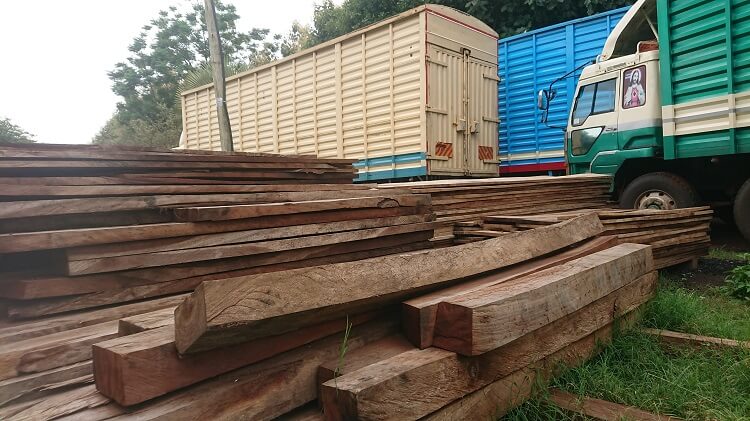
This forest covers the areas of Apaa which has been under contention between the communities of Acholi people of Pabbo Subcounty in Amuru district and Madi of Itirikwa Subcounty in Adjumani district.
Some traders claim that unless the government comes up with alternative sustainable energy sources for the urban dwellers and general sensitization of the public, it will be hard to end the charcoal trade.
“It is the locals who sell the charcoal to us; we also buy and sell it to people in Kampala. If there is nobody who wants charcoal in Kampala, we will also not be selling. So, the government has failed to help all sides. People in Kampala, what can they use to cook minus charcoal? And then the locals who sell us the charcoal are not being stopped,” Bulhamwe said.
The Position Zoka Tropical Natural Tropical Forest in Adjumani district where serious deforestation is taking place.
‘Weak Laws’
On Wednesday 12th July 2023 Gulu Chief Magistrate Said Barigye sentenced suspects to Gulu Main Prison upon pleading guilty of (i) illegal removal and transportation of forest products contrary to section 32 (1)a, (2) of the National Forestry and Tree planting Act, 2003 and (ii) failing to comply with lawful executive No.3 of the President and section 81(f) of the NFA Act.
Each of the convicts was ordered by the court to pay a maximum fine of not exceeding Ugx500,000 and Ugx600,000 for the two counts or serve a default jail sentence of not more than 2 years and 3years of imprisonment for the two counts respectively.
Additionally, the Court ordered all their charcoal to be impounded, auctioned and the money be collected into the government consolidated account and the vehicles released upon owners’ proof of authentic evidence.
The former Member of Parliament for Aruu County cum environmental activist, Samuel Odonga Otto lauds the court for setting a precedent.
“The court has proved that dealing in charcoal is a risky business. It is a victory for the environment,” Odongo cheerfully told DailyExpress, adding that the punishment is very weak.
In order to deter people from the illicit trade and transportation of forest products, Odonga argues that courts need to start charging the offenders under the National Environmental Management Authority Act 2019, (NEMA).
“We want the subsequent offenders to be charged under the NEMA Act, 2019 because it allows subsequent offenders to pay a fine of up to Ugx1Bn shilling. We[Parliament] made a mistake under the NFA Act. I will write to the minister to send a NEMA office in Gulu so that we can charge such a person under NEMA Act and NFA Act. The moment the sentence is deterrent, they will not come back,” Odonga reiterated.
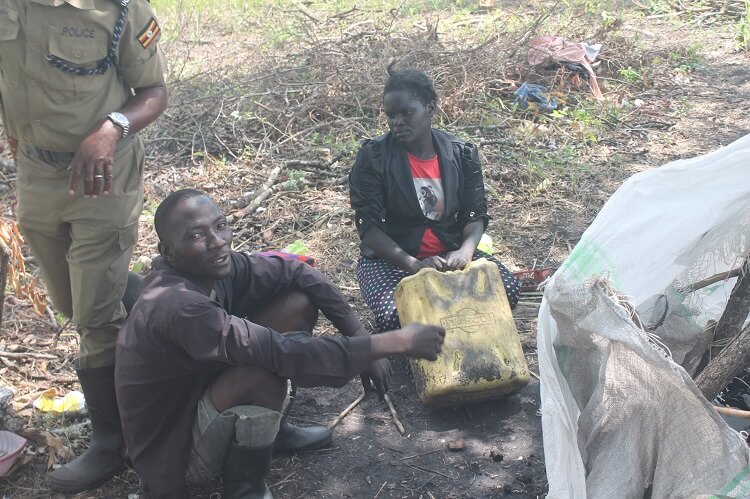
Section 170 of the NEMA Act, 2019 provides for general penalty stating that “a person who contravenes any provision of this Act for which no penalty is specifically provided, commits an offence and is liable on conviction— (a) in the case of an individual, to a fine not exceeding five thousand currency points [equivalent of Ugx100million] or imprisonment not exceeding seven years, or both; or (b) in the case of a body corporate, to a fine not exceeding fifty thousand currency points [Ugx1billion].
Vehemently, using cohesive strategic collaboration to map out hot spots, corridors and discrete charcoal routes, RPP vigilante has teamed up with the Environmental Police Protection Unit (EPPU) and NFA personnel to comb earmarked hotspots across Northern Uganda.
The team leader reveals that they have spotted porous points in Adilang in Agago district, where charcoal is loaded en-route to Kampala via Lira City. Another point is, Awere Bridge where charcoal is ferried from Pader via Omoro district and thirdly some traders are being suspected to buy seals from Uganda Revenue Authority, which is even impossible for police to open those trucks at checkpoints.
Arthur Owor, the Director of African Centre for Research welcomes the ruling. He says given the limitation in the law related to punishing such crimes, the ruling will send strong signals that the judicial officers, executive, local leaders and some statutory bodies are beginning to coordinate and speak the same language.
“The ruling will boost the struggle against environmental violence and crimes in the region. It provides a good entry point for the judiciary which in our opinion was part of the weak link in this struggle. However, there is a need to tighten the grip to make the penalties more punitive,” he said.
What Next?
In April 2023, the Parliament of Uganda allocated to NFA extra Shs 4billion for raising seedlings as a response to save and restore degraded forest land across the country.
In Aswa River Range, John Giribo, the NFA Acting Range Manager for the region told Daily Express that to restore the destroyed ecosystem in Northern Uganda using the National Tree Fund; they have set up nursery beds in Apac, Kacung, Gulu, Lamwo and Kitgum to supply tree seedlings to the community for free to plant on the land outside NFA estates.

However, to implement the presidential order effectively, the central government should prioritize district local government too, especially under Section 63 of National Forestry and Tree Planting Act, 2003.
“If we need to conserve these forests, we need to invoke Section 63 of the National Forestry and Tree planting Act so that we should have forestry committees on grounds in these areas that are affected because right now we are managing at the level of product, but at the production level, we are not doing this. So we need to curtail this from the ground in order for us to implement the presidential order very well,” Giribo suggested.
Whether by crook or hook, vigilante vows to implement this executive order to the latter.
“I thank President Museveni for passing the executive order. If this order is not implemented, we shall implement it the local way” Odonga Otto vowed.
Meanwhile, as advised by Gen Saleh, the sub-regional selected representatives of the Lango, Acholi and West Nile are yet to present their findings on how best the Executive Order No.3 on charcoal trade should be implemented.
Do you have a story or an opinion to share? Email us on: dailyexpressug@gmail.com Or follow the Daily Express on X Platform or WhatsApp for the latest updates.

